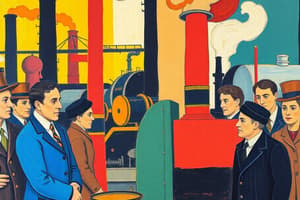Podcast
Questions and Answers
What was a key factor contributing to Great Britain's early industrialization?
What was a key factor contributing to Great Britain's early industrialization?
- A vast and diverse population
- A climate suitable for year-round agricultural production
- A large and easily accessible supply of natural resources (correct)
- A strong and unified national government
Why was Great Britain's geographical location considered advantageous for industrialization?
Why was Great Britain's geographical location considered advantageous for industrialization?
- Proximity to other major European powers, allowing for easy trade and exchange of ideas
- Access to a network of navigable rivers and canals for transportation (correct)
- A strategically advantageous position for military defense
- A temperate climate allowing for the growth of diverse crops
Which of the following options is NOT a factor contributing to early industrialization in Great Britain?
Which of the following options is NOT a factor contributing to early industrialization in Great Britain?
- A high literacy rate among the population
- A rigid social hierarchy that prevented upward mobility (correct)
- A strong military that protected its colonies and trade routes
- A stable banking system that offered loans and investments
What role did the British Empire play in Great Britain's industrialization?
What role did the British Empire play in Great Britain's industrialization?
How did Great Britain's agricultural revolution contribute to its industrialization?
How did Great Britain's agricultural revolution contribute to its industrialization?
Flashcards
First Nation to Industrialize
First Nation to Industrialize
Great Britain was the first country to undergo industrialization, leading to significant economic and social changes.
Industrialization
Industrialization
The process of developing industries in a country or region, typically characterized by the use of machinery and the mass production of goods.
Economic Changes
Economic Changes
Shifts in the economy due to industrialization, often leading to increased productivity and the growth of cities.
Social Changes
Social Changes
Signup and view all the flashcards
Factors for Industrialization
Factors for Industrialization
Signup and view all the flashcards
Study Notes
Factors Contributing to Britain's Early Industrialization
- Britain possessed a unique combination of factors that fostered industrial growth before other nations.
- Abundant natural resources were a critical element. Coal, iron ore, and readily available water power provided the energy needed for factories and machinery.
- Britain's geographic location offered significant advantages. Access to ports and navigable waterways facilitated the transportation of raw materials and finished goods, boosting trade and commerce.
- A robust financial system was in place. Well-developed banking institutions and capital markets enabled the accumulation of investment capital necessary to fund industrial projects.
- Technological innovation was another crucial element. British inventors and entrepreneurs led the way in developing new machines and processes that increased efficiency.
- Expanding agricultural productivity contributed to Britain's industrialization by freeing up labor for factory work. Improved farming techniques and land management boosted food production, reducing the need for manual labor in agriculture.
- Favorable political conditions included stable government and sound legal frameworks. These factors created a secure environment for business activity and innovation. Property rights were well-defined, offering protection for investments and encouraging entrepreneurship.
- A burgeoning population provided a large pool of labor for factories and manufacturing industries. Increased population growth, coupled with migration to urban centers, created a substantial workforce.
- Strong domestic market demand played a significant role. A growing middle class created a demand for manufactured goods, generating both internal sales and profits that fuelled expansion.
- British colonization and its mercantilist policies created access to vast raw materials and captive markets abroad. Overseas empires provided access to raw resources and established markets for British goods. This further fueled economic growth.
- Colonies and overseas territories provided access to raw materials, fueling demand for British industries, a critical contributor to early-stage industrial expansion.
- A culture that fostered innovation and entrepreneurship was also present. Britain's history of scientific inquiry and its emphasis on practical applications contributed to the development of new technologies and processes.
Studying That Suits You
Use AI to generate personalized quizzes and flashcards to suit your learning preferences.




